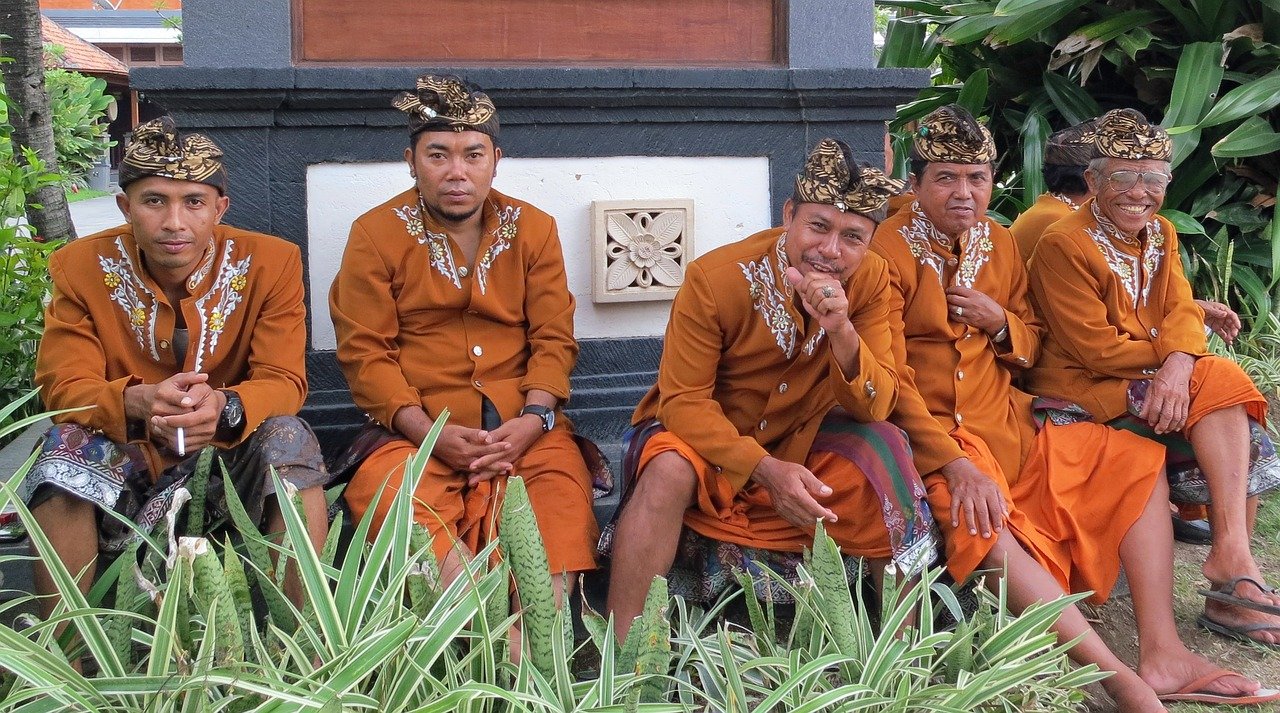The Significance of Holy Water in Balinese Religion
Temples like Tirta Empul in Tampaksiring are an important source of holy water in Bali
Table of Contents Show
Holy water is a powerful aspect of Balinese religion
Holy water holds a special place in the religious practices of the Balinese people. It is not merely a symbol or an abstract concept, but a sacred and powerful agent believed to possess mysterious forces. This article delves into the substance and symbolism of holy water in Balinese Hinduism, exploring its various uses, preparations, and significance in Hindu-Balinese worship.
Holy Water as a Sacred Cleansing Agent
Holy water and petals in the hand of a Balinese priest at a temple ceremony. The holy water will be sprinkled on worshipers as they pray and on offerings to sanctify them.
In Balinese religion, holy water is considered a potent purifier of spiritual impurities. It is believed to have the ability to cleanse and strengthen everything it touches. Whether it is used for individual devotion at a household shrine or in large-scale islandwide ceremonies, holy water plays a central role in Balinese rituals.
The concept of holy water in Balinese religion finds its roots in the Bhagavad-Gita, a significant Hindu epic. In this sacred text, Krishna states that he accepts offerings made with love, including water. This passage forms the theological basis for the use of holy water in Hindu worship, and it further extends to the preparation of flower and food offerings.
The Making and Potency of Holy Water
The Balinese term for holy water is "toya," derived from the Medium Balinese word for water. It is essential to note that holy water is distinct from ordinary water, referred to as "yeh" in the local vernacular. The potency and uses of holy water vary based on how it is made, its source, and the person who prepares it.
The mantras used in the making of holy water determine its mystic energy. The more powerful the mantras, the greater the energy the holy water contains. Similarly, the sanctity of the place from which the water is obtained contributes to its potency. Holy water sourced from a sacred place holds greater significance and power.
Different types of holy water serve various purposes. While the supply kept in family shrines may not require the same potency as that needed for a cremation or temple festival, all holy water is considered sacred. Some varieties may be more appropriate in specific situations, depending on the manifestation of the Hindu deity being invoked.
Handling and Respect for Holy Water
Holy water demands utmost respect and reverence. It must be handled with care and stored in clean containers. Bamboo culms, glass jars, or even ordinary drinking glasses and bottles may serve as containers for transporting holy water. However, it is crucial to ensure that they are thoroughly clean before use.
When handling holy water, it is customary to use the right hand and, if possible, grasp the right elbow with the left hand. The container should be held as high as possible, preferably higher than the heads of others nearby. During temple ceremonies, women often carry containers of holy water on their heads, demonstrating the respect and reverence accorded to this sacred substance.
The Role of Priests and Lay Practitioners
Bali’s priests, called pedandas, are responsible for making holy water using chants of mantras to infuse the water with spiritual energy
Hindu priests, known as pedandas, are responsible for making holy water. Through a ceremony called "maweda," they chant specific mantras and perform hand gestures to infuse the water with spiritual energy. Pedandas prepare three basic types of holy water: pangelukatan pabersihan, which purifies the body; prayascita, which steadies thoughts and purifies the mind; and tirtha biu kawonan, which drives away negative thoughts.
Lay priests, called pemangkus, also make holy water for their respective temples. While they lack the spiritual power and knowledge of pedandas, the holy water they prepare contains the specific power associated with the gods residing in their temples. This water may be sought by individuals seeking the specific powers of these gods or manifestations.
In addition to priests, the dalang, or puppet master, is often called upon to make holy water during a special daytime performance of the wayang kulit shadow puppet theater. The dalang uses special mantras and may dip the sticks of his puppets into the water to prepare holy water known as "toya panyudamalan." This holy water is used to purify individuals affected by acts that took place on inauspicious days.
Preserving the Potency of Holy Water
To maintain the potency of holy water, it must be stored in clean containers and handled with great care. Placing the container on the floor or handling it excessively can render the water ineffective and diminish its mystical power. Those who disrespect holy water may become vulnerable to its negative aspects. Consequently, containers of holy water are typically stored in the shrines of family and public temples.
During temple festivals requiring a significant quantity of holy water, containers are kept in tall temporary shrines known as sanggar agung. These bamboo pole structures serve as both a shrine to the sun and an elevated resting place for holy water. The sanggar agung is a prominent feature of various temple ceremonies.
Conclusion
Holy water holds immense significance in Balinese religion, serving as a powerful agent of cleansing and purification. Its substance and symbolism are deeply intertwined with the religious practices of the Balinese people. Holy water is prepared by priests and lay practitioners using specific mantras and rituals, and its potency varies based on the source and the person who prepares it. By treating holy water with respect and handling it properly, its mystical power can be preserved, ensuring its effectiveness in Balinese rituals and ceremonies.
Fascinated? You might also like to read about: Exploring the Indian Hindu origins of the Balinese Religion and The Fascinating Caste and Clan System in Balinese Religion
Frequently asked questions about holy water and its significance in Balinese religion
What is holy water in Balinese religion?
Holy water in Balinese religion is water that has been blessed by a priest or other religious figure. It is believed to have spiritual and healing properties and is used in a variety of religious ceremonies and rituals.
How is holy water used in Balinese religion?
Holy water is used in Balinese religion for a variety of purposes, including purification, healing, and protection. It is sprinkled on offerings, used to cleanse the body and spirit, and offered to deities and ancestors.
What is the significance of holy water in Balinese religion?
Holy water is significant in Balinese religion as it is believed to have spiritual and healing properties. It is used to purify and cleanse the body and spirit, and to seek the blessings and protection of the deities and ancestors.
How is holy water obtained in Bali?
Holy water is obtained in Bali through a variety of means, including from natural sources such as springs and rivers, and through the blessing of a priest or other religious figure.
What are some of the specific uses of holy water in Balinese religion?
Some of the specific uses of holy water in Balinese religion include purification ceremonies, offerings to deities and ancestors, healing rituals, and protection from negative energies and spirits.
How does the use of holy water reflect the Balinese belief in the interconnectedness of all things?
The use of holy water reflects the Balinese belief in the interconnectedness of all things by emphasizing the idea that the spiritual and physical worlds are intertwined. Holy water is used to purify and cleanse the body and spirit, and to seek the blessings and protection of the deities and ancestors.
How does the use of holy water reflect the Balinese philosophy of Tri Hita Karana?
The use of holy water reflects the Balinese philosophy of Tri Hita Karana by emphasizing the importance of maintaining balance and harmony between humans, nature, and the divine. Holy water is used to seek the blessings and protection of the deities and ancestors, and to maintain spiritual balance and harmony within the community.
What are some of the natural sources of holy water in Bali?
Some of the natural sources of holy water in Bali include springs, rivers, and other bodies of water that are believed to have spiritual and healing properties. These sources are often located near temples or other sacred sites.
How is holy water used in traditional Balinese medicine?
Holy water is used in traditional Balinese medicine for its healing properties. It is believed to have the ability to cleanse the body and spirit of negative energies and to promote physical and spiritual well-being. It may be used in a variety of treatments, including massage, herbal remedies, and other therapies.
How does the use of holy water contribute to the preservation of Balinese cultural heritage?
The use of holy water is an integral part of Balinese cultural heritage and is passed down through generations. The traditional practices and rituals associated with holy water help to preserve and promote Balinese culture. They serve as a way to maintain and celebrate the unique customs and traditions of Bali, and to honor the spiritual heritage of the community.






















Bali's remarkable rice terraces draw numerous tourists. However, could tourism pose a threat that the age-old Subak system might struggle to overcome?